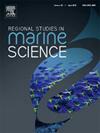Food for thought: Marine pollution's impact on One Health and food security in African SIDS
IF 2.1
4区 环境科学与生态学
Q3 ECOLOGY
引用次数: 0
Abstract
Aquaculture and fisheries are essential for food security and livelihoods in coastal communities and contribute, though modestly, to the GDP of African nations, particularly Small Island Developing States (SIDS). Marine pollution poses significant social, economic, and environmental challenges to these industries. The One Health approach, which recognises the links between marine pollution, health, and food security, provides a comprehensive framework for addressing these issues. To mitigate these challenges, country-specific strategies should focus on strengthening legal frameworks for pollution control, promoting environmental stewardship, enhancing regulation enforcement, improving waste management, and fostering stakeholder engagement. Key technological innovations include marking fishing gear to prevent ghost fishing, implementing integrated multi-trophic aquaculture and aquaponics to reduce eutrophication, and improving fish disease management while preventing aquaculture escapes. Addressing antimicrobial resistance (AMR) is also crucial for long-term sustainability. Additionally, enhancing multisectoral coordination, regional cooperation, and integrating traditional knowledge with modern practices can help safeguard both communities and ecosystems in these vulnerable regions.
求助全文
约1分钟内获得全文
求助全文
来源期刊

Regional Studies in Marine Science
Agricultural and Biological Sciences-Ecology, Evolution, Behavior and Systematics
CiteScore
3.90
自引率
4.80%
发文量
336
审稿时长
69 days
期刊介绍:
REGIONAL STUDIES IN MARINE SCIENCE will publish scientifically sound papers on regional aspects of maritime and marine resources in estuaries, coastal zones, continental shelf, the seas and oceans.
 求助内容:
求助内容: 应助结果提醒方式:
应助结果提醒方式:


